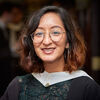
Shelley Angelie Saggar
- Course: MA Postcolonial Literary and Cultural Studies
- Graduation: 2016
What made you want to apply to your course and to Leeds?
I began studying at the University of Leeds as an undergraduate in the School of English. I have maintained a research interest in the intersection between political projects and their cultural representations throughout my studies, and this was a driving factor in my decision to stay on at Leeds to pursue postgraduate study.
Leeds has been at the forefront of pioneering research and study in the field of postcolonial literary studies since the inception of the first ‘Commonwealth Literature’ course in the mid-20th century. Additionally, staff in the School of English are well versed in indigenous cultural studies, a field which is greatly under-developed in the UK and something that my own research necessarily steers me towards.
I am committed to the political project that I read in the term ‘the postcolonial’. Necessarily implying a dismantling of prevailing privileges and structural frameworks, postcolonial studies as I understand it is an ever-growing field, the parameters of which can be adjusted to encompass a holistic way of understanding global history.
Literary and cultural representations remain the primary ways of communicating narratives of history, identity and belonging, and so the study of postcolonial literatures and cultures is, for me, an urgent area of study in imagining and developing the future.
How would you describe your experience of studying at Leeds?
The School of English is a wonderfully welcoming place to learn and develop as a scholar. It is a hub for lectures, talks and meetings and the staff always encouraged me to think of myself as a part of the academic community.
I studied a module called ‘Global Indigeneity’, which was fascinating and provided a valuable opportunity to gain access to texts and films that would otherwise never be made available to us.
Leeds is a wonderful city for students and young people - the campus and city centre are compact enough that they quickly feel like home but there are always new things to discover, especially in the surrounding Yorkshire countryside.
During my studies, I was on the committee of three different University societies, which was a lot of work but incredibly stimulating. The skills I learnt outside the lecture theatre contributed to my academic performance and a commitment to initiating dialogue between the academic and wider public spheres.
What do you plan to do once you've graduated?
I am currently working as a Communications Officer for a humanitarian aid agency in London. One of my main focuses has been to nuance the NGO narrative somewhat by concentrating on how the history of colonialism has contributed to conflict, poverty and under-development in the regions we work in.

